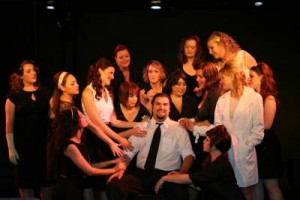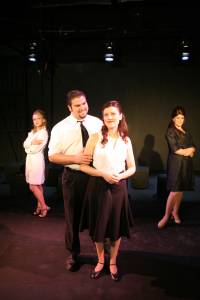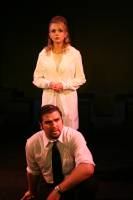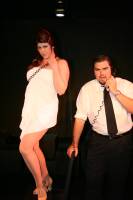
When Rob Marshall’s movie adaptation of Arthur Kopit and Maury Yeston’s Nine came out last year, many reviewers and moviegoers shook their heads. Could this film (rated a mere 6.2 by imdb.com users and a dismal 49/100 by major media reviewers*) actually have been nominated for twelve Tonys and won five (including Best Musical and Best Score) when it debuted as a Broadway musical in 1982? What did the original show have that Marshall’s movie lacked?
Now I happen to have been one of those who liked (but didn’t exactly love) Nine The Movie, if only for the performances of its all-star cast. Still, having seen Hunger Artists Theatre Company’s produzione eccelente of Nine The Musical, I can understand audiences’ and critics’ disappointment.
What the Broadway show had in abundance and what the movie lacked was music. Fully half of Yeston’s gorgeous songs didn’t make it into the movie, their place taken by dramatic scenes (like Carla’s suicide attempt) that seemed out of place in a movie musical.
Fortunately, the Hunger Artists production not only contains the full Yeston score (over ninety minutes of music in a show that runs about two hours and fifteen minutes) but has the great good fortune to be performed by a cast well up to the task of bringing Yeston’s exquisite songs to fourteen-channel stereophonic life.
That’s right. Fourteen channels.
There are fourteen women on stage virtually at all times, frequently joining voices in some of the most glorious harmonies you’re likely to hear all year. No microphones needed! And in a non-Equity black box production no less!
Actually, the black box setting is a perfect one for Nine, which takes place entirely in the mind and the memory of its protagonist Guido Contini, a man confronting a perfect storm of midlife crises—a script he can’t seem to write for a movie whose deadline hangs ominously over his head, a wife of twenty years who is asking for a divorce, and a movie star mistress threatening suicide if he doesn’t get that divorce and marry her.
Nine director Susan Marx opens the Hunger Artists production with all fourteen women in Guido’s life seated onstage behind the man they hate to love (or love to hate), each adding her voice to a cacophony of complaints which turns into Nine’s celebrated “Overture Delle Donne.”
And quite a group of donne they are. Luisa Contini (Tara Pitt), Guido’s unhappy wife; Carla Albanese (Lindsay Martin), Guido’s unhappy mistress; Claudia Nardi (Rachel Buffett), Guido’s favorite leading lady and Contini muse; Mamma Contini, Guido’s adoring mother (Andrea Martyn); Liliane La Fleur (Deborah Kennedy), Guido’s producer and former grande vedette des Folies Bergère; Lina Darling (Jenny C. Jones), Lina’s imperious sidekick; Stephanie Necrophorus, (Andrea Dennison-Laufer), a pushy American film journalist; Our Lady of the Spa (Cynthia Lee), proprietress of the health spa where Guido and Luisa have gone in search of peace and quiet; Mama Maddelena (Veronique Merrill Warner), the head of the spa chambermaids; and Sarraghina (Janet McGregor), the whore who initiates 9-year-old Guido into the ways of women. Completing the female cast as various other women in Guido’s life are Carol Celeste as Maria, Amber Scott as Annabella, Mirna Carbajal as Diana, and Kaitlyn Tice as Renata. (Not a weak link among them.)
As Guido’s mind wanders from place to place and time to time and woman to woman, we in the audience are treated to some of the most beautiful Broadway songs of the ‘80s, songs which showcase the talents of fourteen donne favolose.
Pitt, an OC treasure, is a luminous Luisa, whether singing “legit” in “My Husband Makes Movies” or furiously belting out “Be On Your Way.” The sensational Martin nails every sensual minute of the seductive “A Call From The Vatican,” returning later to sing “Simple” quite simply and beautifully. Kennedy is très française and très delicieusesinging “Follies Bergeres.” Martyn is all maternal wamth singing “Nine” to a 9-year-old Guido. An earthy McGregor sings the inferno out of Sarraghina’s provocative “Be Italian.” Buffett, looking every bit the blonde and beautiful movie star, sings a poignant “Unusual Way” in a lovely soprano.
At the performance mentioned, the enchanting Justin VanLigten brought tears to this reviewer’s eyes with a perfectly on pitch and heartbreakingly earnest “Getting Tall.” (Justin alternates in the role of Young Guido with his fraternal twin Matt.)
Finally, taking on the challenging role of Guido himself, a part originated on Broadway by Raul Julia (and Antonio Banderas in the 2003 revival) and on film by Daniel Day-Lewis, is OC actor Dan Wozniak. Tough acts to follow, especially by a performer who appears a good decade younger than Guido’s forty years. But miracle of miracles, Wozniak gives an entirely credible, beautifully acted and powerfully sung performance. Vocally, he shines in “Guido’s Song,” “Only With You,” “The Bells Of St. Sebasitian,” and “I Can’t Make This Movie.” Though not your traditional musical theater leading man, Wozniak has the charisma to make you believe he could attract all these women like moths to a flame. (As proof of this, the gorgeous Buffett is Mrs. Wozniak in real life.) Wozniak also makes you believe in this complex man’s crises, not just of film, but of faith and of life.
Director Marx deserves high marks indeed for her work here, for her imaginative use of the stage, the show’s swift pacing, and the pitch perfect performances of its cast. Martin not only plays Carla but has choreographed some lively dance numbers, most particularly “Follies Bergere,” with its chorus line moves and the longest feather boa I’ve ever seen, and the sexy “Be Italian,” featuring a dozen tambourines fresh from the sandy beaches of Guido’s childhood. Music director Chris Smith has the ladies harmonizing alla perfezione to prerecorded tracks by Patrick Copeland/UpTil4 Productions which give the show the big orchestral sound it deserves. Smith’s lighting design adds subtly to Nine’s changing moods. Thumbs up too to Ted Leib and Smith’s sound design. The mostly black costumes are uncredited, which leads me to believe they are the cast’s own choices, and they very good ones at that. Kara Kessener is production stage manager.
Hunger Artists Theatre Company’s production of Nine is every bit as fine as what one might expect from an L.A. 99-Seat Plan production featuring Equity cast members—high praise indeed. Those who would like to see exactly why Nine is considered one of the truly great musicals of the 1980s would do well to make the trek to Fullerton to a tiny theater in the middle of an industrial strip mall where musical magic is being made.
*per metacritic.com
Hunger Artists Theatre Company, 699-A South State College Blvd, Fullerton.
www.hungerartists.com
–Steven Stanley
April 25, 2010
Photos: Emily Brauer Rogers






 Since 2007, Steven Stanley's StageSceneLA.com has spotlighted the best in Southern California theater via reviews, interviews, and its annual StageSceneLA Scenies.
Since 2007, Steven Stanley's StageSceneLA.com has spotlighted the best in Southern California theater via reviews, interviews, and its annual StageSceneLA Scenies.







 COPYRIGHT 2024 STEVEN STANLEY :: DESIGN BY
COPYRIGHT 2024 STEVEN STANLEY :: DESIGN BY